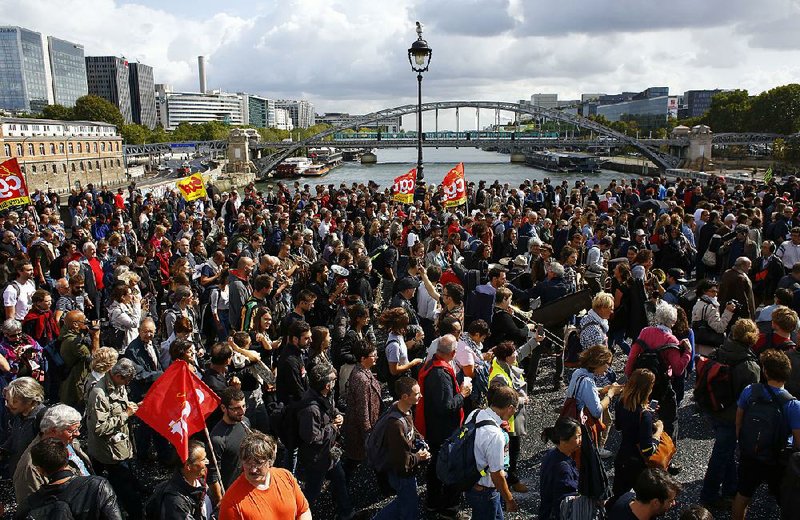PARIS -- The first big street protests since France's new president, Emmanuel Macron, took office in May unfolded in cities across the country Tuesday as union members went on strike to protest government plans to overhaul labor regulations.
Large street demonstrations last year helped pressure Macron's predecessor, Francois Hollande, to dilute a plan to overhaul the notoriously complex labor code. The latest rallies come as Macron aims to revamp the French economy.
But the demonstrations also gave a chance for those angry at the government to express frustrations about other matters, including budget cuts, plans to overhaul the pension system, and Macron's own style of governing.
Macron, however, was nowhere near the protests. He arrived in the Caribbean on Tuesday to visit the French islands of St. Martin and St. Barthelemy after they were hit by Hurricane Irma last week.
Protests took place in Lyon, Nantes, Toulouse and a dozen other cities, led by unions and parties on the left that contend that worker rights would be watered down by the overhaul of the French labor code, which is known as the Code du Travail.
More than 60,000 people demonstrated on the streets of Paris, according to unions, which called the protests a success. The Paris police prefecture said the figure was closer to 24,000.
Tear gas was fired and rocks were thrown during sporadic clashes between police and small groups of protesters on the fringes of the main march in Paris, but the overall mood was calm. Last year, weeks of protests against similar labor changes were sometimes marred by violence.
The changes to the labor code would loosen regulations for small companies, make it easier to hire and fire employees, and enable businesses to negotiate certain workplace issues at the company level rather than having to abide by industrywide agreements.
Jean-Luc Melenchon, the founder of the leftist France Unbowed party, said Tuesday that Macron "can and must back down." France Unbowed is organizing a separate demonstration against the labor overhaul for Sept. 23.
"This isn't our last stand," Melenchon told reporters at a demonstration in the southern city of Marseille, which he represents in the lower house of Parliament. "We are organizing a relentless defense of the labor code."
But the government is not expected to budge. Macron is enacting the overhaul to the labor rules by decree, and the changes are expected to be implemented this month.
Also, opponents of the new labor rules have been divided in their response. Among the major French unions, only the hard-line General Confederation of Labor called on its members to demonstrate Tuesday.
Victor Mendez, 46, a railway engineer who was been a member of the General Confederation of Labor for the past three years, said during the rally in Paris that he was opposed to Macron creating "disposable workers."
"It's hard to get a job, but it has become so easy to get fired," he said.
Top leadership at the more moderate unions, which were not entirely happy with the changes but welcomed the summer-long talks the government held to explain them, did not call on their members to protest.
Some groups joined the rallies to protest against other measures planned by Macron's government, including budget cuts for civil servants and cuts in housing subsidies for students.
Existing anger against Macron was amplified last week when he said, in a speech in Greece, that those who opposed the changes for France were "slackers" or "cynics."
Although Macron didn't specify whom he was targeting -- and although he later added that he meant "all of those who for the past 15 years have said we mustn't move in France and in Europe" -- some citizens felt affronted, including Serge Amely, a 50-year-old nurse's aid who said that he thought the comments were "unworthy of a leader."
"I've been working for the past 32 years, I wake up everyday at 5 a.m., I'm no slacker and my work is difficult," Amely said during the demonstration in Paris, where dozens held signs that read "Slackers of all countries, unite!" or chanted "Macron, president of the bosses!"
A Section on 09/13/2017

